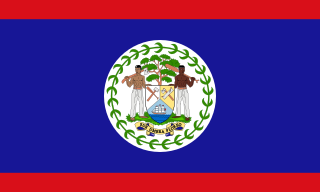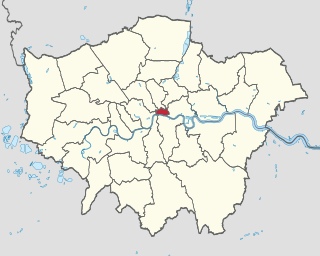
Belize is a country on the north-eastern coast of Central America. It is bordered by Mexico to the north, the Caribbean Sea to the east, and Guatemala to the west and south. It also shares a water boundary with Honduras to the southeast.

Belize is a parliamentary representative democratic monarchy, whereby the king of Belize serves as head of state and the prime minister is the head of government, and of a multi-party system. Executive power is exercised by the government. Legislative power is vested in both the government and the Parliament of Belize.

The Belize Defence Force (BDF) is the military of Belize, and is responsible for protecting the sovereignty of the country. The BDF is under the Ministry of National Defence and Border Security, which is currently headed by Hon. Florencio Marin Jr.; the BDF itself is commanded by Brigadier General Azariel Loria. In 2012, the Belizean government spent about $17 million on the military, constituting 1.08% of the country's gross domestic product (GDP).

The Metropolitan Police Service (MPS), formerly and still commonly referred to as the Metropolitan Police, is the territorial police force responsible for law enforcement and the prevention of crime within the ceremonial county of Greater London. In addition, it is responsible for some specialised matters throughout the United Kingdom, including national counter-terrorism measures and the protection of specific people, such as the monarch and other members of the royal family, members of the government, and other officials.

The City of London Police is the territorial police force responsible for law enforcement within the City of London, England, including the Middle and Inner Temples. The force responsible for law enforcement within the remainder of the London region, outside the city, is the much larger Metropolitan Police, a separate organisation. The City of London, which is now primarily a financial business district with a small resident population but a large commuting workforce, is the historic core of London, and has an administrative history distinct from that of the rest of the metropolis, of which its separate police force is one manifestation.

John David McAfee was a British-American computer programmer, businessman, and two-time presidential candidate who unsuccessfully sought the Libertarian Party nomination for president of the United States in 2016 and in 2020. In 1987, he wrote the first commercial anti-virus software, founding McAfee Associates to sell his creation. He resigned in 1994 and sold his remaining stake in the company. McAfee became the company's most vocal critic in later years, urging consumers to uninstall the company's anti-virus software, which he characterized as bloatware. He disavowed the company's continued use of his name in branding, a practice that has persisted in spite of a short-lived corporate rebrand attempt under Intel ownership.
The Criminal Investigation Department (CID) is the branch of a police force to which most plainclothes detectives belong in the United Kingdom and many Commonwealth nations. A force's CID is distinct from its Special Branch. The name derives from the CID of the Metropolitan Police, formed on 8 April 1878 by C. E. Howard Vincent as a re-formation of its Detective Branch. British colonial police forces all over the world adopted the terminology developed in the UK in the 19th and early 20th centuries, and later the police forces of those countries often retained it after independence. English-language media often use "CID" as a translation to refer to comparable organisations in other countries.

Bedfordshire Police is the territorial police force responsible for policing the ceremonial county of Bedfordshire in England, which includes the unitary authorities of Bedford, Central Bedfordshire and Luton. Its headquarters are in the town of Kempston in Bedford Borough.

Essex Police is a territorial police force responsible for policing the county of Essex, in the East of England. Essex Police is responsible for a population of over 1.8 million people and an area of 1,420 square miles (3,700 km2).

The Sibun River is a river in Belize which drains a large central portion of the country. The Sibun (Xibun) were ancient Maya people who inhabited the region.
Law enforcement in Pakistan is one of the three main components of the criminal justice system of Pakistan, alongside the judiciary and the prisons. The country has a mix of federal, provincial and territorial police forces with both general and specialised functions, but the senior ranks of all the provincial forces and most of the federal ones are manned by members of the Police Service of Pakistan (PSP). The PSP is one of the most prestigious part of the Central Superior Services, Pakistan's main civil service organisation. Federal law enforcement agencies are generally overseen by the Ministry of Interior of the Government of Pakistan, while provincial police forces are overseen by a department of the government of that province.

The Belize Coast Guard is the maritime security, search and rescue, and the maritime and law enforcement service branch of Belize. The BCG is under the Ministry of Home Affairs.

The monarchy of Belize is a system of government in which a hereditary monarch is the sovereign and head of state of Belize. The current Belizean monarch and head of state since 8 September 2022, is King Charles III. As sovereign, he is the personal embodiment of the Belizean Crown. Although the person of the sovereign is shared with 14 other independent countries within the Commonwealth of Nations, each country's monarchy is separate and legally distinct. As a result, the current monarch is officially titled Kingof Belize and, in this capacity, he and other members of the royal family undertake public and private functions as representatives of the Belizean state. However, the King is the only member of the royal family with any constitutional role.

Relations between Belize and the United States have traditionally been close and cordial. The United States is Belize's principal trading partner and major source of investment funds. It is also home to the largest Belizean community outside Belize, estimated to be 70,000 strong. Because Belize's economic growth and accompanying democratic political stability are important U.S. objectives, Belize benefits from the U.S. Caribbean Basin Initiative. Belize is the only country in Central America that has never received a visit from an American president.

His Majesty's Government in Belize, also referred to as the Belizean Government is the democratic administrative authority of Belize, a constitutional monarchy under a parliamentary democracy. It was formed in 1981 after gaining sovereignty from the United Kingdom. The constitution is the supreme law of Belize.
The illegal drug trade in Guatemala includes trans-shipment of cocaine to the United States. According to some reports, Mexican drug cartels such as Sinaloa have also established poppy growing operations there. There is a reported relationship between the Mexican Los Zetas cartel and the Guatemalan Kaibiles military force.
Edmee Yolanda Schakron-Rodríguez is a Belizean activist and People's United Party candidate, best known as the aunt of murder victim Chris Galvez and a founder and president of Belizeans For Justice. Schakron was briefly the PUP standard bearer for the Lake Independence House constituency in 2012, but her candidacy was disallowed due to her dual citizenship at the time in Belize and the United States, after which she renounced U.S. citizenship. Schakron was the unsuccessful PUP nominee for Mayor of Belize City in 2015.
The Gang Suppression Unit is a special unit of the Belize Police Department, formed in 2010.

Gringo: The Dangerous Life of John McAfee is a 2016 American documentary film, about the portion of John McAfee's life spent in Belize. The film was directed by Nanette Burstein and produced by Ish Entertainment. The film had its world premiere at the Toronto International Film Festival on September 11, 2016, before airing on Showtime on September 24, 2016.
Julio René AlvaradoRuano was a fourteen-year-old Guatemalan boy who was killed in the Belize–Guatemala adjacency zone during an armed confrontation between the Belize Defence Force, Belizean park rangers, and Guatemalan farmers. The incident raised tensions between Belize and Guatemala, who have an ongoing border dispute since 1821. Belizean officials maintain that the Belize Defence Force acted in self-defence. However, the Guatemalan government claims the incident was a deliberate attack carried out by Belize's military. After the incident, the Organisation of American States agreed to investigate the death of Julio Alvarado at the request of both countries.













